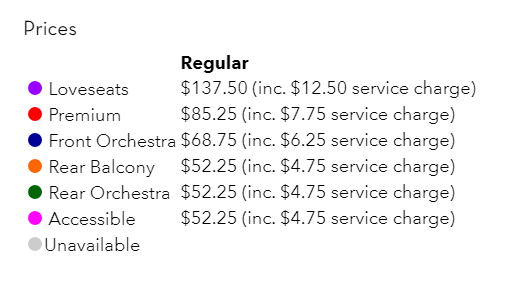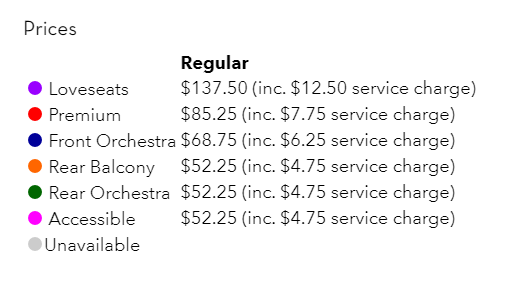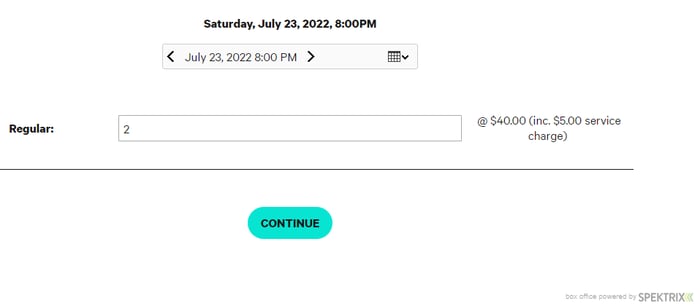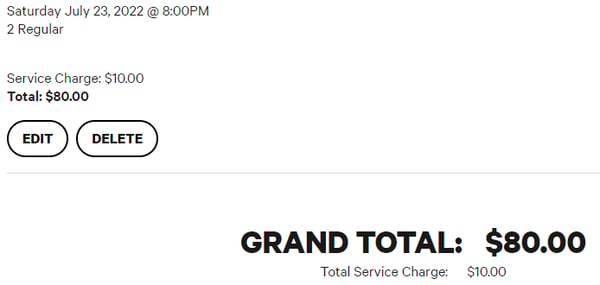8 min read
Get Ready for Ticketing Legislation - A guide for theaters & venues

Fans and legislators are clamping down on hidden ticket transaction fees. Make sure your marketing and box office systems are ready.
In December 2024, the Federal Trade Commission (FTC) announced a junk fees rule that requires businesses to:
- "Clearly and conspicuously disclose the true total price inclusive of all mandatory fees whenever they offer, display, or advertise any price of live-event tickets."
- "Display the total price more prominently than most other pricing information."
- When excluding allowable fees upfront (e.g. shipping), "clearly and conspicuously disclose the nature, purpose, identity, and amount of those fees before consumers consent to pay."
The advice in this blog is written primarily around the FTC ruling, and we're updating it regularly in response to evolving legislation. However, be sure to consult federal and state resources directly for the latest guidance and the specifics for your state.
New York was first to pass a bill targeting hidden ticket fees back in 2022 - and in the wake of public outcry over recent onsales, states including California, Colorado, Connecticut, Maryland, and Minnesota - alongside many others across the US and Canada - followed suit. The FTC ruling in late 2024 targeted bait-and-switch pricing for live-event ticket sales nationwide.
The various ticketing legislation bills at state and senate level vary in certain specifics, but they center around a single requirement. Ticket sellers are now expected to disclose all-in pricing - a change which offers more transparency to ticket buyers, improves patron experience, and builds trust between customers and arts and culture organizations.
Find out how you can update online purchase pathways, marketing campaigns, and event management policies to ensure you’re compliant with the latest consumer protection bills (and why it’s good business, no matter where in the world you're based).
The most important moment in an online transaction
“The most important moment in an online transaction - the moment where you need the greatest trust between your organization and your patron - is the moment when they pull out their wallet and make the payment. If that’s the same moment you introduce fees for the first time, and the price you’re asking them to pay increases by 10, 15%, that trust is broken.” says Spektrix co-founder & CEO Michael Nabarro.
Michael was managing a theater in Cambridge, England in 2007 when he realized there must be an easier and better solution to build connections between venues and their audiences. Since then, Spektrix has focused on creating ticketing, marketing and fundraising technology with those vital relationships at its heart.
“Though some audiences might still pay to see an artist or show they love, a lack of price transparency erodes audience trust and has a long-term customer loyalty impact,” adds Liv Nilssen, Spektrix VP for Sector Strategy. “Patrons may be less likely to attend, to donate, or to add merchandise items, because they’re already over budget on the fees.”
Liv's extensive experience in mission-driven organizations gives her a unique perspective, balancing the immediate revenue needs of non-profits with the longer term benefits of customers who feel delighted, secure, and respected in their interactions, both in-person and online.
We’re not legal experts - as these bills come into effect, you’ll need to explore exactly what they mean for your sector and state. We’re not resellers, so we’re not focusing on the secondary market aspect of ticketing legislation. But we are experts in online ticketing and customer service, and in that capacity we've identified four key practices that will help you promote events and booking journeys that are compliant, secure and trustworthy, building great customer experiences and ultimately improving relationships and revenue.
We’ve pulled our examples from the FTC's rule banning junk ticket fees. Other consumer protection bills, including federal ticketing legislation like the Fans First Act, set similar expectations for disclosure of fees, charges, and upfront visibility around the total cost of a ticket.
Download our full guidance on Customer Friendly Policies - advice on building lasting audience connections through honest interactions, extending a great front of house welcome into patrons’ online experiences.
Four steps to ensure your ticket sales comply with the latest state legislation
Display ticket or transaction fees upfront
"Hidden fees are prohibited. People don’t want to waste time with tickets that end up being outside of their budget. The rule requires businesses to disclose the total prices upfront. That means ads must include the maximum total of all mandatory fees or charges people will have to pay,"
The FTC’s bipartisan Junk Fees Rule and your business
In other words, the true cost of a ticket must be upfront and obvious in the booking pathway from the beginning. This includes full transparency of any transaction or processing fees, rather than hiding fees in terms and conditions. The only exception is for fees related to a specific delivery option, such as a charge for mailing out tickets. More on that later.
Similar legislation has been in place in the UK for some time. This is how Spektrix users across the pond ensure transparency to ticket buyers.
Before the booking journey
In printed materials like posters and season brochures, show a single price or price range inclusive of all fees. This will also work on your what's on pages or live event listings, before customers click 'Book Now' to enter the purchase path.


In the UK, Victoria Theatre in West Yorkshire presents mainly one-night events. They list a single 'From £26.75' price point on their top level listings, linking out to further detail elsewhere in their brochure and website. They also explain clearly why their Theatre Support Fee is important and invite patron feedback.

With longer runs, Soho Theatre in London lists out price points for different event dates on their website and provides detail of discounts and commissions in the text block to the left.
Within the booking journey
Once a customer enters the online booking journey, you may need to be a little more specific. This is your last opportunity to disclose full pricing to ticket buyers ‘prior to the ticket being selected for purchase’.
Set up your ticketing system to itemize ticket commissions, then explore ways to show both the ticket value and the cost of any fees. How you approach this will vary depending on the number of price bands and concessions you offer, but here are some approaches already in use in the US which we think work particularly well.

In Arizona, Fox Tucson Theatre itemize prices for multiple seating areas beside their seating chart, showing the complete price up front and then informing customers how much of that figure is a service charge.

At the start of the purchase path, patrons at Two River Theater in New Jersey select the number of tickets they'd like. The complete price is listed to the right, and again it's immediately evident how much of that price is made up by the service charge.

Before checkout, Two River's patrons have another chance to see the complete value of their cart with the service charge included in the Grand Total and itemized in a smaller font beneath it.
Setting it up in your ticketing system
If you’re using a ticketing system that allows you to configure patrons’ booking journeys on your own site, you can work with your web developers to present your own pricing and fee structure. If you’re working with a system in which transactions are completed on a different domain - often called a white-label site - you may have less control, and you’ll need to verify what steps your ticketing provider is taking to comply with the new legislation.
In Spektrix we offer both options - you can choose between a configurable booking journey on your own site, managed by a web developer, or a white-label solution provided and supported by us at no extra cost. With either option, you can configure ticket commissions to apply and display exactly as you wish across confirmation emails, seating plans and price lists, just like the examples above.
If you have complex pricing structures, you may benefit from working with a web developer to ensure this information is presented as clearly as possible. Here’s how to set up or adjust your ticket commissions.
Disclose the full price of the ticket from the start of each transaction
"Misleading fees are prohibited. You can’t lie about the fees you charge. Tell customers what’s being charged and why, and how much people will pay."
The FTC’s bipartisan Junk Fees Rule and your business
We’ve all been tempted by an airline or big arena show advertising tickets for $100, only to find ourselves paying an additional $50 or $60 in service charges, processing fees and more. This kind of price gouging is exactly what the various ticketing legislation bills set out to overcome. As US Senator Richard Blumenthal phrased it in, “Airline travel, concert going, common purchases - seemingly almost everywhere - consumers are compelled to pay hidden excessive charges. Our bill will help end this price gouging - forcing full disclosure upfront and restricting abusive fees. It will mandate basic common sense fairness and transparency, which consumers rightly demand and deserve.”
While this legislation won’t protect you against poor artistry on stage, the last thing your theater needs is to be associated with bad anything. To set yourself apart and build customer trust, make sure your total price is displayed clearly and consistently throughout the booking journey, and that the highest or total price is the most visible of all.
Disclose allowable fees upfront
"Certain fees can be disclosed later in the transaction. Unless you say prices displayed are the final amount people will pay, you can omit certain charges you may not know upfront. Examples of charges that you can disclose later include taxes, shipping, and fees for optional goods or services selected by the consumer as part of the same transaction. But, if you exclude these fees from your display prices, you still have to tell people about the fees, and be truthful about information like their nature, purpose, and amount, before you ask people to make a final payment."
The FTC’s bipartisan Junk Fees Rule and your business
You may wonder if you can still charge delivery fees for tickets. Most legislatures still allow you to apply reasonable charges for fulfillment methods that involve an actual cost to you - such as printing or mailing out paper tickets, as well as taxes. Like all other charges, these fees must be quoted clearly so your customers are able to make an informed decision about their preferred method of delivery.
In your ticketing system, check the settings for different delivery methods to ensure you’re not adding charges for electronic/print at home tickets and to adjust the fees for other delivery methods if you think they might be considered ‘unreasonable’. In Spektrix, you can do this by setting up delivery commissions.
Clearly demonstrate your refund policy
“Tell the truth when it comes to fee-related information that matters, like whether fees are refundable."
The FTC’s bipartisan Junk Fees Rule and your business
This one’s pretty simple - be honest and transparent about your refund information and provide refunds in full. This only applies to mandatory fees, like service charges - it’s your choice whether to refund optional charges for physical tickets, credit card payments, or similar.
In some systems it can be surprisingly tricky to refund fees along with a ticket purchase. Check that your system allows you to see and refund fees as well as ticket price when you edit or return a transaction; in Spektrix, for example, you’ll see a breakdown of every cost associated with the original transaction, and can include or exclude them from any refund at the click of a button.
State-specific ticketing legislation
You can find a full list of the latest state-by-state ticketing legislation on the website of the National Conference of State Legislatures (NCSL).
While there are many common threads, specific requirements are set by bills adopted or in progress across different states, there's not a consistent approach across either the US or Canada - and things are changing fast.
Below we provide an at-a-glance guide to some of the most common policies and how your ticketing system should help you to fulfil their requirements.
Avoid deceptive websites
Demonstrate to patrons that they’re securely completing transactions on your venue or artist website, with integrated pathways or branded domains: www.tickets.myvenue.com inspires consumer confidence in a way that www.applausetix.com never will.
Seat disclosure
Let customers choose seats, and share all ticket details in your confirmation emails, with seats sold directly from your venue or through agencies with managed access to your live seating plan.
All-in pricing
Work with your web developer to list prices upfront and itemize charges, transaction fees, or other hidden costs.
Fan safety
Partner and share data with agencies to include secondary ticket buyers in essential pre-event communications.
Helping the arts and culture sector prepare for ticketing legislation
Spektrix is committed to helping theaters, arts centers, and entertainment organizations succeed. We’re happy to share more of what we know about supporting users to comply with similar legislation, and we’d love to hear your ideas for turning this legislation into an opportunity to improve your patrons’ booking experience.
If you’re already using Spektrix, get in touch with our Client Success team. We’re happy to support you or your web developers to make any changes you need.
If you’re not using Spektrix, we’re still here to help. As a certified B Corporation, we’re invested in the success of the arts sector.
Talk to one of our CRM and ticketing experts to learn how Spektrix could help your organization prepare for the latest bills.


